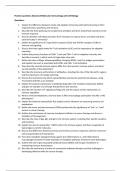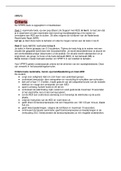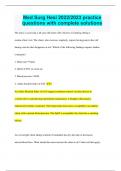Practice questions Advanced Molecular Immunology and Cell Biology
Questions:
1. Explain the difference between innate and adaptive immunity, particularly focusing on their
response times, specificity, and memory.
2. Describe the three pathways of complement activation and their shared final outcomes in the
immune response.
3. How do dendritic cells (DCs) transition from immature to mature forms, and what role does
each form play in immunity?
4. Explain the significance of C-type lectin receptors (CLRs) and Toll-like receptors (TLRs) in
immune cell signaling.
5. Discuss the three-signal model for T-cell activation by DCs and its importance for adaptive
immunity.
6. Outline the primary functions of CD8+ T cells and CD4+ T cells in adaptive immunity and
describe a scenario in which each cell type plays a key role.
7. Define the roles of Major Histocompatibility Complex (MHC) I and II in antigen presentation
and explain how each is associated with CD8+ and CD4+ T-cell activation.
8. How does the mucosal immune system differ from the systemic immune system, and what
are the benefits of this distinction?
9. Describe the structure and function of antibodies, including the role of the Fab and Fc regions
and the importance of isotype switching.
10. Discuss the mechanisms by which autoantibodies can lead to autoimmune diseases, using
rheumatoid arthritis as an example.
11. Explain the purpose and process of antibody-dependent cell-mediated cytotoxicity (ADCC)
and give an example of a cell type that performs this function.
12. Describe the function of T regulatory (Treg) cells and the impact of their dysfunction on
immune regulation.
13. What is immunometabolism, and how does it affect macrophage polarization into M1 or M2
phenotypes?
14. Explain the Seahorse extracellular flux analysis and its relevance to measuring immune cell
metabolism.
15. Define the tumor microenvironment (TME) and describe the significance of “hot” vs. “cold”
tumors in cancer therapy.
16. Outline the mechanisms of immune checkpoint inhibitors in cancer therapy and discuss a
limitation of this approach.
17. Describe the roles of IgA, IgE, and IgG in the immune system, including their specific locations
and functions.
18. Explain the role of natural killer T (NKT) cells in the immune system and their recognition of
lipid antigens via CD1 molecules.
19. Discuss the differences between primary and memory immune responses and how memory T
cells are generated and maintained.
20. How does metabolic reprogramming support pro-inflammatory vs. anti-inflammatory
macrophage functions? Provide examples of metabolic pathways involved in each phenotype.
21. Outline the role of gut-associated lymphoid tissues (GALT) and the gut microbiome in
maintaining immune homeostasis.
22. Describe the mechanism of action of monoclonal antibody therapies and the challenges in
developing effective mAbs for cancer therapy.
, 23. What is the importance of T-cell priming in the context of vaccine development, and how
does antigen presentation shape the quality of the T-cell response?
24. Explain how B cells recognize antigens independently of T-cell help and the types of
responses this activation induces.
25. Discuss the role of pattern recognition receptors (PRRs) like TLRs and CLRs in recognizing
pathogens and shaping adaptive immunity.
26. Explain the role of antigen presentation in shaping T-helper cell differentiation, specifically
how cytokine profiles influence T-helper subsets like Th1, Th2, Th17, and Treg.
27. Describe how anti-tumor vaccines are designed to promote cytotoxic T-cell responses and list
the key factors required for effective vaccine formulation.
28. Explain how immune cell trafficking is regulated at the blood-brain barrier, and discuss how
this is altered in multiple sclerosis (MS).
29. Outline the types and functions of glycosylation in the immune system and discuss the
immune responses to glycopeptide antigens.
30. Discuss the pathology of multiple sclerosis, including the immune cells involved in myelin
degradation and the resulting effects on the central nervous system.
31. Describe the phases of T-cell activation in response to chronic infections or cancer and the
concept of T-cell exhaustion.
32. How does the choroid plexus contribute to immune surveillance in the central nervous
system, and what changes occur in MS?
Questions:
1. Explain the difference between innate and adaptive immunity, particularly focusing on their
response times, specificity, and memory.
2. Describe the three pathways of complement activation and their shared final outcomes in the
immune response.
3. How do dendritic cells (DCs) transition from immature to mature forms, and what role does
each form play in immunity?
4. Explain the significance of C-type lectin receptors (CLRs) and Toll-like receptors (TLRs) in
immune cell signaling.
5. Discuss the three-signal model for T-cell activation by DCs and its importance for adaptive
immunity.
6. Outline the primary functions of CD8+ T cells and CD4+ T cells in adaptive immunity and
describe a scenario in which each cell type plays a key role.
7. Define the roles of Major Histocompatibility Complex (MHC) I and II in antigen presentation
and explain how each is associated with CD8+ and CD4+ T-cell activation.
8. How does the mucosal immune system differ from the systemic immune system, and what
are the benefits of this distinction?
9. Describe the structure and function of antibodies, including the role of the Fab and Fc regions
and the importance of isotype switching.
10. Discuss the mechanisms by which autoantibodies can lead to autoimmune diseases, using
rheumatoid arthritis as an example.
11. Explain the purpose and process of antibody-dependent cell-mediated cytotoxicity (ADCC)
and give an example of a cell type that performs this function.
12. Describe the function of T regulatory (Treg) cells and the impact of their dysfunction on
immune regulation.
13. What is immunometabolism, and how does it affect macrophage polarization into M1 or M2
phenotypes?
14. Explain the Seahorse extracellular flux analysis and its relevance to measuring immune cell
metabolism.
15. Define the tumor microenvironment (TME) and describe the significance of “hot” vs. “cold”
tumors in cancer therapy.
16. Outline the mechanisms of immune checkpoint inhibitors in cancer therapy and discuss a
limitation of this approach.
17. Describe the roles of IgA, IgE, and IgG in the immune system, including their specific locations
and functions.
18. Explain the role of natural killer T (NKT) cells in the immune system and their recognition of
lipid antigens via CD1 molecules.
19. Discuss the differences between primary and memory immune responses and how memory T
cells are generated and maintained.
20. How does metabolic reprogramming support pro-inflammatory vs. anti-inflammatory
macrophage functions? Provide examples of metabolic pathways involved in each phenotype.
21. Outline the role of gut-associated lymphoid tissues (GALT) and the gut microbiome in
maintaining immune homeostasis.
22. Describe the mechanism of action of monoclonal antibody therapies and the challenges in
developing effective mAbs for cancer therapy.
, 23. What is the importance of T-cell priming in the context of vaccine development, and how
does antigen presentation shape the quality of the T-cell response?
24. Explain how B cells recognize antigens independently of T-cell help and the types of
responses this activation induces.
25. Discuss the role of pattern recognition receptors (PRRs) like TLRs and CLRs in recognizing
pathogens and shaping adaptive immunity.
26. Explain the role of antigen presentation in shaping T-helper cell differentiation, specifically
how cytokine profiles influence T-helper subsets like Th1, Th2, Th17, and Treg.
27. Describe how anti-tumor vaccines are designed to promote cytotoxic T-cell responses and list
the key factors required for effective vaccine formulation.
28. Explain how immune cell trafficking is regulated at the blood-brain barrier, and discuss how
this is altered in multiple sclerosis (MS).
29. Outline the types and functions of glycosylation in the immune system and discuss the
immune responses to glycopeptide antigens.
30. Discuss the pathology of multiple sclerosis, including the immune cells involved in myelin
degradation and the resulting effects on the central nervous system.
31. Describe the phases of T-cell activation in response to chronic infections or cancer and the
concept of T-cell exhaustion.
32. How does the choroid plexus contribute to immune surveillance in the central nervous
system, and what changes occur in MS?




